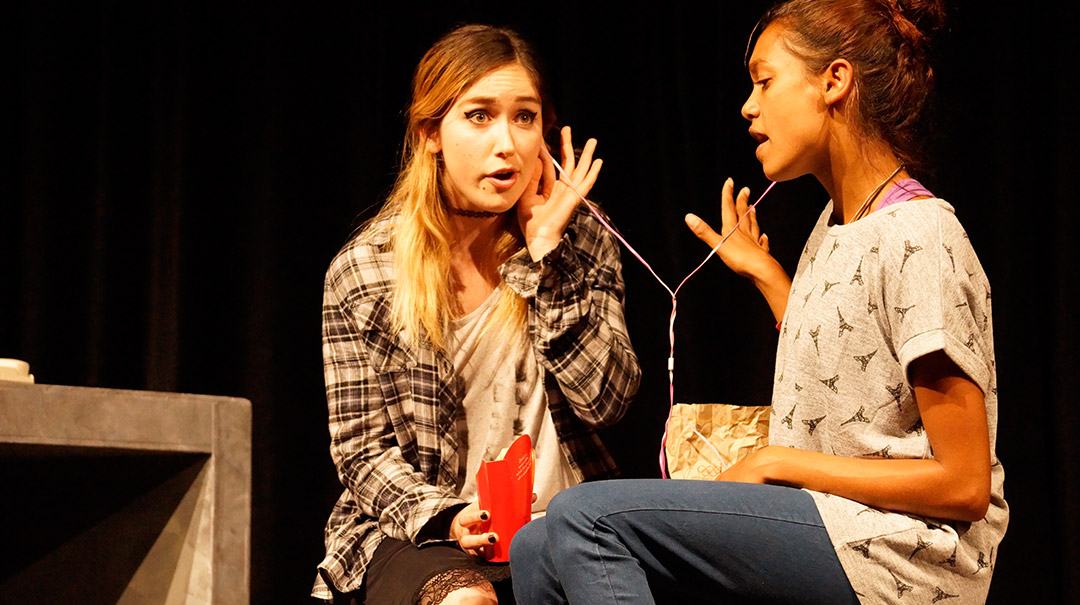Youth mental health takes a bow: The impact of theatre


From young people identifying mental health as their biggest concern, to calls for increased investment in the mental health of 0 to12-year-olds, the mental wellbeing of young people is a complex issue that we, as a society, are increasingly willing to tackle. However, schools and psychologists’ offices are not the only places that can help support a young person’s mental wellbeing.
Last year, the Australian Theatre for Young People (ATYP) commissioned research into what, if any, impact their drama programs have had on the mental health of participants over the last few decades. With thousands of young people engaging in programs each year and a history as the largest youth theatre in the country, there were a number of past and current participants’ experiences to draw on. For Fraser Corfield, Artistic Director of ATYP, participating in drama workshops offers more than just skills in acting or performing.
“There is a broad understanding that the deteriorating mental health of young Australians is a major issue in this country. It is an issue that we need to address that, at the moment, we are struggling to address. We’re also aware that young people, while they are spending more time on devices, are spending less time personally engaging with each other,” he said.
“So rather than just a nice feel-good creative outlet, theatre and performance is a really practical way of addressing some really serious issues that are facing broader society. I think this report, certainly for ATYP and the youth arts sector, is the beginning of broadening that conversation.”
“ATYP has been using the same philosophy essentially for 53 years. We work with all different artists, on all different projects, but the principle of placing young people at the centre of the work has been the same,” said Fraser.
Maintaining social connections is one of the best ways for people to stay mentally well, as illustrated by the message, “Share the Journey”, the theme for October’s Mental Health Month. This is something that ATYP also identified.
“We talk about the importance of self-expression and telling your own story and “finding your tribe”, which is a term that youth theatres use over and over, which is great for people that respond to those sorts of things, but people who don’t, who generally are our decision-makers and people with no connection to the arts, do not. They have no interested in those terms at all and even when we talk about innovation and creative thinking and creative problem-solving, the general assumption that that is specifically within a theatre context, not within broader life skills.”
However, for those who participated in the research, those broader life skills are exactly what they found drama workshops to have developed. Of the more than 1,200 people who participated in the survey, 89% reported that participating in drama had a positive impact on their self-confidence and 94% of respondents said that it had a positive impact on their overall sense of wellbeing. Slightly more than half of all respondents – 52% of people – indicated that ATYP had a positive or very positive impact on their anxiety levels.
In the report, it states: “One person noted that as a young boy, he suffered from bullying and severe anxiety. ‘ATYP helped bring me out of my shell and nurtured my passion for performing.’”
“The level of positivity, I have to admit, really caught us by surprise…We weren’t expecting it to be this strong.”
There were other aspects to theatre and wellbeing that the survey also uncovered, particularly around the anxiety and stress around performing.
“While the majority of people identified very positive things, some people did find that they found the performance element of participating in drama stressful, which isn’t surprising. And my feeling is that those two things are probably connected. So it’s the stress leading up to performance that gives the sense of accomplishment and success afterwards,” said Fraser.

ATYP has worked with young people in NSW and around the country through a range of programs that have reached children and young people in a number of ways. Among their projects, one worked directly with young people to create a play responding to their experiences of homelessness.
“The Advocate for Children and Young People got in touch with us and asked whether we would look at creating a show that raises awareness and demystifies homeless amongst teenagers and young people because there are over 18,000 young people in NSW who are classified as homeless. The state government has realised that theatre is a powerful tool to start conversations around social issues.”
Fraser shared an example of a program that ATYP had run with a partner organisation in Tennant Creek. The ATYP residency, along with the partner organisation’s rodeo program, was the most effective approach for encouraging young Indigenous children to reengage with schooling.
“Both programs established a positive routine, they gave the young people positive role models, they were something that got the young people interacting with each other in a positive way and delivered a sense of accomplishment…they found, once young people participated in both those programs, they were far more likely to return to school for a period of time. So I think there’s a range of things around theatre and performance in terms of just forcing us to connect, reengage, look at the people around us, listen to them and get outside of ourselves. That’s hugely beneficial,” he said.
“There’s broader conversations at the moment going with [universities] and other project partners about now leveraging this into a three year, national study, involving multiple youth arts organisations to try and drill further into that kind of connection between participation [in the arts] and resilience and mental health.”
For now, ATYP will continue to deliver its weekly drama workshops in Sydney, develop work around Australia and produce theatre that centres the experience of young people, for young people to engage in and see themselves in.
“One of the things that I love about the research is it demonstrates these benefits occur without any conversation around mental health. So there’s part of me that goes ‘we need to keep that because I think the death knell of theatre, and theatre for young people, is that we keep using theatre to try and teach young people about something’,” said Fraser.
“I think we need to be really careful as the national youth theatre that we don’t become issue-based. Having said that, it is also a great opportunity. Theatre, when it’s done well, gives us the opportunity to see the world from another person’s perspective.”
“We always used to say we were driven to help people act. But actually we’re driven to improve the lives of young Australians and the way that we do that, and what we’re interested in, is the transformative effect of participating in drama.”
By Tasnim Hossain
Tasnim is a writer for WayAhead and a board director at ATYP. Tasnim was not involved in the ATYP research.
Back to most recent edition
Newsletter
Stay up to date
Sign up to our Mind Reader newsletter for monthly mental health news, information and updates.

